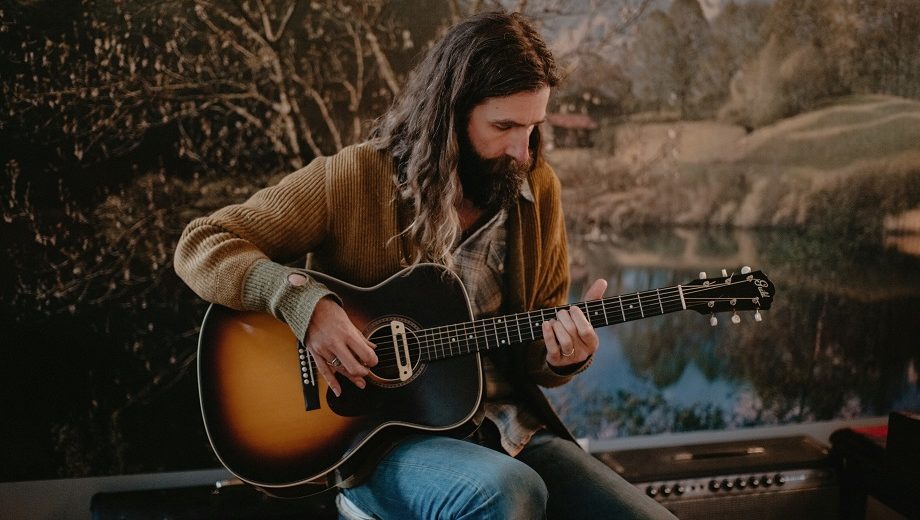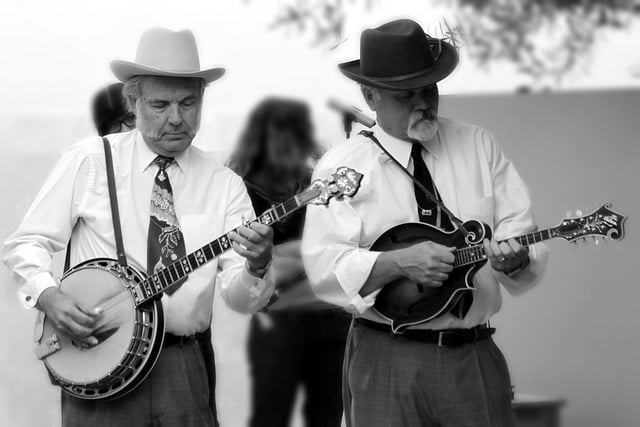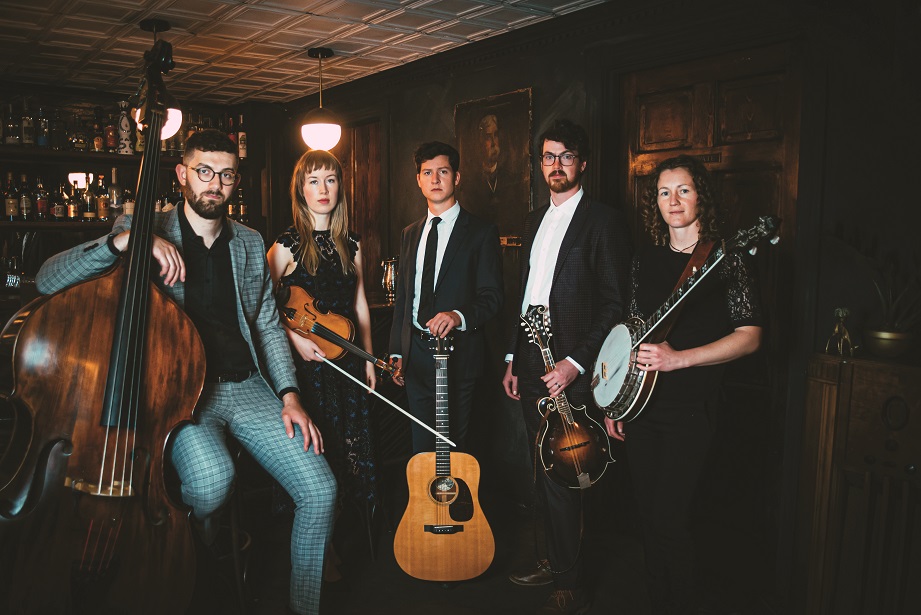From the onset of the Chatham Rabbits‘ new record, Be Real With Me, the North Carolina-based husband and wife duo are at a crossroads of sorts.
On one hand, its opening track, “Facing 29,” is filled with the despair of growing older, but on the other it also relishes in the wisdom and knowledge that comes with making it another year around the sun, as one half of the pair Austin McCombie sings of “Grabbing 30 by the strap of his boots.”
That relationship with age, the maturity that (typically) accompanies it, and the people that come and go along the way are a constant through line of the album in what Sarah McCombie describes as a journey of self discovery. “This is very much a millennials record,” she says.
Their fourth album, Be Real With Me is the duo’s most personal and vulnerable yet, a touch that’s already resonated well for them through things like 2020’s COVID-inspired 194-show Stay At Home Tour and an appearance on PBS’ limited series On The Road. “I strongly believe that putting the fans first, instead of the industry or the mystique of being an artist, has been what’s carried us to where we are now and keeps us motivated,” Sarah asserts.
The album is also set to be their most sonically diverse to date, with drum machines, synthesizers, pedal steel, and other new layers being brought into the mix. Ahead of its release, we spoke with the McCombies about the varying means of growth and evolution within it, how a pen pal inspired one of its songs, the family farm that keeps them grounded when not touring, and more.
You mentioned this being a very “millennial” record due to the heavy themes of growing up and growing away from certain people or things. Are there any other big themes that help to tie these songs together?
Sarah McCombie: Another thing that came up a lot when I was writing the songs for this record is the way we often tell others we’re doing the best we can even when we’re not, which is the case on songs like “Collateral Damage” and “Gas Money.” Sometimes you’re just completely maxed out with nothing left to give a situation other than just being a hindrance to yourself.
I thought about that a lot on “Matador,” which I wrote from a place of repeating the patterns of trusting people too fast or getting into situations that aren’t healthy, ignoring red flags along the way. Looking back, if I slowed down or was more mature I never would’ve found myself in those situations in the first place.
It all ties into the overarching theme of growing up, looking yourself in the mirror, and having these real, maturing moments. Sometimes we have to go through tough experiences to come out the other side. Where we’re at now, in our late 20s and early 30s, is when you typically come to grips with a lot of that and being real with yourself, like the album title suggests, so you can move forward in an authentic way.
Speaking of moving forward in an authentic way, your song “Gas Money” came about through an organic exchange with a longtime fan of the band that has evolved into your close pen pal. Care to explain?
SM: In the past, I’ve overcommitted or maxed myself out with friendships due to music, moving, or other circumstances that I can no longer be there for in the way I used to be. So when my pen pal Eve, who’s going to be 87 this year, sent me one of her letters containing a card with an orange sticky note with a $20 bill on it that said “for gas money for the long road home,” I knew I had to get it in a song. It’s such a cool line that reminded me of Patty Griffin’s “Long Ride Home” and turned into a story about wishing you could give more or that a friendship could be more, but you’re just maxed out at your current life stage and cannot possibly give more to that relationship.
Whether it’s pen pals like Eve or just the personal way you interact with your fans in general, it seems like both have gone a long way in pushing your career forward, in some cases almost more than the songs themselves.
SM: I couldn’t agree more. We draw so much inspiration for our music from our fans. None of what we do would be possible without them keeping us going. In addition to “Gas Money,” there’s a song on our 2022 record called “You Never Told Me I Was Pretty” that a fan also inspired.
Regarding “Gas Money,” I think there’s also a beauty in not wanting to over promise and under deliver in a relationship while still wanting to make a connection or stay in touch. And what kinder thing [is there] to do than pop a $20 in the mail in a letter to say, “Hey, I’m reaching out because you mean something to me”? I remember sending Eve the press release for the song when it came out to let her know how she inspired the chorus and to invite her to our next show in Charlottesville near where she lives. She got back to me saying she’d love to, but she’s already committed to a date that night. I thought it was so sweet how she let me down respectfully and had her boundaries about it, because that is something that’s a big part of this record as well.
Another big part of not just this record, but your lives as a whole is the family farm you live on in North Carolina. Mind telling me about that and how your work on it inspires and informs your music?
SM: The farm has been in my family since 1753, but we bought it from my grandfather a couple years ago, right before he passed away. It used to be 640 acres, but is 65 now; we still own the original cabin and home site, horses – it’s like its own entity.
It’s taught me that working really hard feels really good on a blood, sweat, and tears level. Moving fences, hauling water, and other physical work feel great to accomplish, but so do the aspects of planning ahead and working with others to build a vision. It’s very similar to how we collaborate in the band with other musicians or with graphic artists and other creatives. On that note, we work with another couple who are Angus beef farmers to help keep up our property, because it’s so much land and we’re gone so much of the time. No matter what though, the intentional behavior of putting time and effort into something, whether that be our land and the farm or songwriting and interacting with our fans, is definitely a place where you reap what you sow.
In addition to what we’ve already discussed about the record’s themes of growth, I’ve also seen you describe this project as a “new chapter” for the band. How so?
SM: We’re writing a lot more about ourselves and present-day experiences and less about older stories from our family. I went through a big phase earlier on writing Civil War-era ballads, but now we’re getting more comfortable being vulnerable with our fans and writing about our relationships and what we’re individually going through, which is huge.
Sonically, we’ve had the pleasure of working the last two years with Ryan Stigmon, an incredible pedal steel player who now tours with Zach Top. Getting to play with the pedal steel and its ambient sounds overlaid on guitar and banjo was really fun, new, and different for us. We also brought in a keys player on this record and have been touring with one as well. And “Gas Money” is an example of where we used a drum machine for the first time. We were taking a lot of ’90s pop influence from artists like Robyn and Annie Lennox. It’s led to us becoming more aware of how people are coming to see our shows and like our music because of the song, not because of the genre. We don’t care about labels, we just want to write what feels good.
Another new route y’all take on this album is with the song “Big Fish, Small Pond,” the band’s first instrumental. What led to its creation?
SM: Austin came up with the melody and we tracked it completely live in the studio, Small Pond, that we named the song after. We had an octave mandolin, banjo, guitar, and upright bass on it that we jammed on after popping gummies one night sitting around our microphones. It was around midnight or so and we got into this state and played through it a bunch of times until we got the right take.
It never had any lyrics – an instrumental is just something Austin and I had always wanted to try. We both typically just get by playing our instruments and take much more pride in our songwriting, but we still wanted to try our hand at it and challenge ourselves to place in the middle of the record that would be a breather – or intermission – from everything else we’re singing about.
Since you just mentioned that song being like an intermission, tell me about the song sequencing and how that’s helped to shape this record?
Austin McCombie: We’re really diligent about the song order. It’s not a perfect chronological order, but it does start with the first song written for this record, “Facing 29,” which helps to set the tone of getting older. As the record goes on, we also strategically placed the instrumental in the middle as a breather followed by some heavier songs like “Did I Really Know Him,” “One Little Orange,” and “Pool Shark’s Table.” It was a fun way to show how after all this reflection, we can still look in the mirror and acknowledge that we’re young, have problems, and may not be ready to change it all yet. Sometimes you have these heavy conversations where you leave trying to work on yourself and other times you table things because you aren’t ready for it, and that’s fine too.
What has the process of bringing Be Real With Me to life taught you about yourselves?
AM: It’s pushed me to realize I have more musical ability than I thought, in terms of co-producing and playing so many different instruments. In our genre you have the Andrew Marlins and Billy Stringses of the world and other folks who absolutely rip, but Sarah and I don’t really fit into that category. While that’s still true, it’s been fun to push ourselves with this record, which has given me more motivation to continue leaning into our songwriting in a deeper, more meaningful way than just a fun story about our family members. There’s still room for that, but clearly the magic is happening for us when we dig deeper.
SM: It’s taught me how to confront things I’m uncomfortable with and to not hold back as much. For instance, the song “Collateral Damage” starts with me singing, “I want my freedom and I want a baby.” It makes me cringe just saying it, but that song and phrase has wound up being a big talking point amongst fans and one of our most well-received songs during shows.
What do you hope others take away from listening to this record?
SM: I hope this record feels relatable to people in our age demographic and others wanting to look back on that time in their own lives, serving as a reminder that we’re all just trying to figure things out. It may be difficult, but if we can be real, honest and vulnerable with each other then it will ultimately help us be in a better place.
Photo Credit: Samuel Cooke



